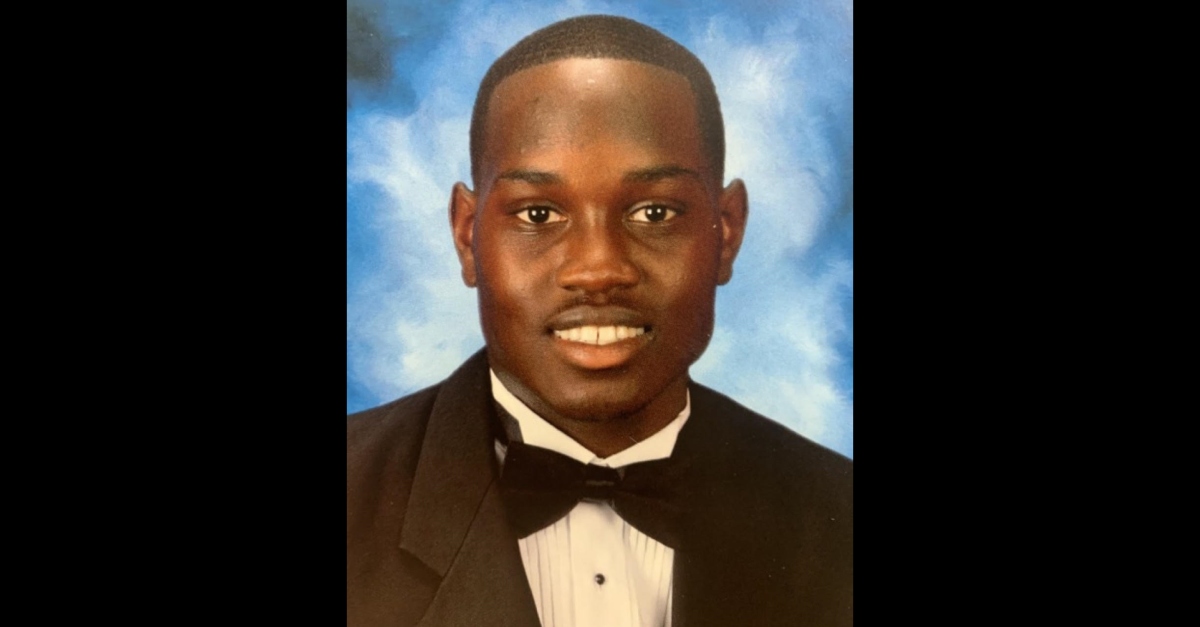
Ahmaud Arbery. (Image via Attorney Benjamin Crump.)
Wanda Cooper, the mother of Georgia shooting victim Ahmaud Arbery, on Tuesday filed a multi-million-dollar federal civil rights lawsuit against the three men accused criminally of killing him. The suit also names a bevy of other individuals, including a police officer, a police chief, and other officials who handled the matter.
Cooper is suing Travis McMichael, the triggerman who shot and killed Arbery, and his father, Gregory McMichael, who drove an accompanying vehicle. She’s also suing William “Roddie” Bryan, who recorded video of the widely-publicized shooting; Officer Robert Rash; Police Chief John Powell; prosecutor Jackie Johnson; George Barnhill; and several unknown officers known as John Does 1-10. Glynn County, Ga., is also a named defendant as a political body.
The 47-page lawsuit, singed by nine attorneys from five different cities, alleges 14 separate counts. Those attorneys filed the case exactly one year after Arbery’s killing.
“On the afternoon of February 23, 2020, Ahmaud Arbery, a young Black man, laced up his running shoes and went for a jog,” the lawsuit’s opening salvo begins. “An avid runner, Ahmaud frequently jogged around his neighborhood and surroundings areas in Brunswick, Georgia, including Satilla Shores. But February 23, 2020 was different. That day three armed white men, Defendants Gregory McMichael, Travis McMicheael, and William Bryan — entrusted by local law enforcement to respond to recent trespasses in the area, and armed with a Police-Department-issued revolver and a 12-gauge shotgun — hunted Ahmaud down in their trucks. Based on a ‘gut feeling’ that Ahmaud was responsible for prior thefts in the neighborhood, these Defendants shot Ahmaud three times at close range with their shotgun and killed him. As Ahmaud lay bleeding out on the pavement, Defendant Travis McMichael stood above him and said, ‘fucking N*****.'”
The original lawsuit uses the N-word without redaction.
It alleges that Gregory McMichael, a recently retired officer, was “authorized” by the Glynn County Police Department “to stand in as law enforcement and to respond to recent neighborhood trespasses ‘day or night.” Those actions added up to deputization, the lawsuit alleges.
The connection between the McMichaels and the Department resulted in the Department’s failure “to meaningfully investigate the circumstances surrounding Ahmaud’s death,” the lawsuit says. It also says local District Attorney Jackie Johnson had known Gregory McMichael and “instructed law enforcement not to arrest [him], his son, or Bryan.”
Johnson “orchestrate[d] a cover-up,” recused herself, and then handed the case to George Barnhill in a neighboring county. However, Barnhill also failed to disclose that he also “had a personal connection with Gregory McMichael.” Still, when the conflict became known, Barnhill issued a letter which justified the shooting as “perfectly legal.” That letter, the lawsuit says, was “based on a a multitude of demonstrably false statements,” including “painting Ahmaud as a violent and unstable criminal who had attacked the McMichaels.”

Travis McMichael, Gregory McMichael, and William Bryan are seen in jail booking photos.
“For nearly three months, Glynn County police officers, the chief of police, and two prosecutors conspired to hide the circumstances surrounding Ahmaud’s death and to protect the men who murdered him,” the lawsuit continues. “And none of this would have been discovered but for video footage leaked to the media, which showed the horrific and brutal murder of Ahuamd. Two days after the video was released to the public and drew national attention and outrage, law enforcement finally arrested Defendants Travis McMichael, Gregory McMichael, and William Bryan for murder.”
Cooper, who is suing on her own behalf and as administrator of Ahmaud Arbery’s estate, is alleging civil rights violations under 42 U.S.C. § 1983. She’s also using 28 U.S.C. §§ 1331 and 1343 to allege violations of the U.S. Constitution and federal law. Plus, she’s using 28 U.S.C. § 1367 to ask a federal judge to hear underlying state law claims under what’s known as supplemental jurisdiction. That law allows federal judges to hear state law claims which arise in the same “case or controversy” as a similar federal claim.
Key to the claim is the alleged deputization. According to the lawsuit, the police “affirmatively authorized and encouraged Defendants Gregory McMichael, Travis McMichael, and William Bryan to intercede on behalf of the Glynn County Police Department if a person entered the structure on English’s property. In so doing, law enforcement insinuated itself into a position of interdependence” with those three defendants. “These three men were therefore acting under color of law at the time they stalked, tracked, and shot Ahmaud Arbery.”
In other words, according to the lawsuit, the men were government actors who deprived Arbery of his “right to be free from excessive force and unreasonable seizure” under the Fourth Amendment.
The lawsuit alleges the following counts:
- Excessive Force and Unlawful Seizure (against Travis McMicahel, Gregory McMichael, and William Bryan) ($1 million in damages);
- Failure to Intervene (against Travis McMicahel, Gregory McMichael, and William Bryan) ($1 million in damages);
- Conspiracy to Violate the Fourth Amendment (against Travis McMicahel, Gregory McMichael, and William Bryan, Officer Robert Rash, and various John Doe police officials);
- Conspiracy to Interfere with Civil Rights (all defendants) ($1 million in damages);
- Failure to Prevent Harm (Officer Rash and various John Doe police officials) ($1 million in damages);
- State Created Danger (Officer Rash and various John Doe police officials) ($1 million in damages);
- Substantive Due Process (Officer Rash and various John Doe police officials) ($1 million in damages);
- Failure to Supervise, Discipline, and Train (Glynn County and Chief John Powell) ($1 million in damages);
- Denial of Access to the Courts (Jackie Johnson and George Barnhill) ($1 million in damages);
- Conspiracy to Obstruct Justice (Jackie Johnson and George Barnhill) ($1 million in damages);
- Wrongful Death (loss of future services, support, society, comfort, affection, guidance, tutelage, and contribution) and Survival (loss of past and future income potential; pain and suffering prior to death; emotional distress prior to death) (all defendants);
- Conspiracy and Battery (Travis McMicahel, Gregory McMichael, and William Bryan) ($1 million in damages);
- Willful and Wanton Misconduct (against Travis McMicahel, Gregory McMichael, and William Bryan, Officer Robert Rash, various John Doe police officials, and Glynn County) ($1 million in damages);
- Libel (against George Barnhill) ($1 million in damages).
As to the latter count, the lawsuit says Barnhill “falsely asserted that Ahmaud Arbery had committed the crime of burglary” in writing to both the Glynn County Police Department and to Georgia Attorney General Chris Carr.
Attorneys J. Kyle Califf of Atlanta; S. Lee Merritt, Mark V. Maguire, Daniel N. Purtell, and John J. Coyle of Philadelphia; Rizwan Qureshi and DeAndre R. Morrow of Washington, D.C.; William Weltman of Chicago; and Tia M. McClenney of Pittsburgh signed the document.
“Did you know that one of the officers that gave the McMichaels permission to hunt Ahmaud still works for the PD?” Merritt tweeted after the case was filed. “Everyone involved in the targeting, murder and cover-up in the case of #AhmaudArbery must pay criminally and civilly.”
Attorney Ben Crump also tweeted a statement:
Read the full lawsuit below.
Ahmaud Arbery Civil Lawsuit by Law&Crime
Have a tip we should know? [email protected]